GETTING THE BEST FROM YOUR CHARTER
By Grant Dixon
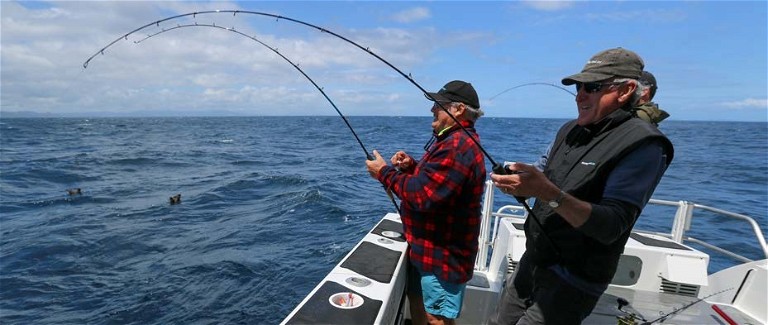
Charter fishing was a part of my angling education from a young age.
My very first charter trip was on board one of the public ‘party’ charter boats out of Tauranga as a teenager. My mate and I were on a camping holiday at Mt. Maunganui, sleeping in a large tandem trailer with a tarp thrown over the stock crate!
We arrived at the boat just five minutes from departure and we were ‘shown’ to our fishing possies by the regulars – somewhere near the bow – and off we chugged at a speedy seven or so knots to a reef I now know was somewhere near the Penguin Shoals. Our day was a disaster – fishing at the front of an anchored boat with too little lead, the wrong rig (we were set up for shallow harbour fishing with long traces when we should have had a ledger setup), little food and water, with a hangover to boot.
We met most of our fellow anglers during the day, mostly as we untangled our lightly weighted rigs from theirs, social intercourse no one appreciated. I couldn’t wait to get ashore having spent the excursion as ‘that guy’ that did his best to ruin everyone else’s trip by being an under-prepared dick!
Fast forward to the following summer and I was ready to dip my toes back in the chartering scene. Having made our booking on a Whangamata boat, my buddy and I were at the wharf when the boat came in the night before. We spoke to the skipper and asked him what we would be targeting and how.
He said tarakihi were on the bite at Mayor Island and that we would need ledger rigs, eight-ounce teardrop sinkers, Japanese-style 1/0 longline hooks and tuatuas for bait. The skipper also suggested we get down to the wharf 30 minutes before departure and line up to get the best spots across the stern as we would be anchored in a reasonable amount of current.
We followed the instructions to the letter and the result was a stunning catch, to the point the skipper had us string up all our fish and carry them off the boat and down the wharf – my introduction to guerilla marketing!
On the way out that day, a bunch of Kaipara fishers tried their best to throw us off our game, asking us what we were planning to catch with those ‘sprat hooks’ and looked in amusement at our supply of steamed tuatuas, comparing them with their ‘smorgasbord’ that included mullet, trevally and kahawai, which they planned fishing on 7 or 8/0 Kahle hooks!
Charter fishing offers me the opportunity to relax and concentrate on ‘my’ fishing. I trust the skipper to put me on the fish to the best of their ability, as well as run the vessel in a safe, comfortable manner. I always like to discuss the trip with them first so I can have my bases covered on the day, without taking along half a tackle store.
Preparation and good comms most-often ensure everyone has a good day – from skipper, any crew and the anglers. Speaking with a number of operators and anglers, the word ‘communication’ featured heavily in the discussions.

When there is a crowd of anglers, braid and mono lines don’t mix well.
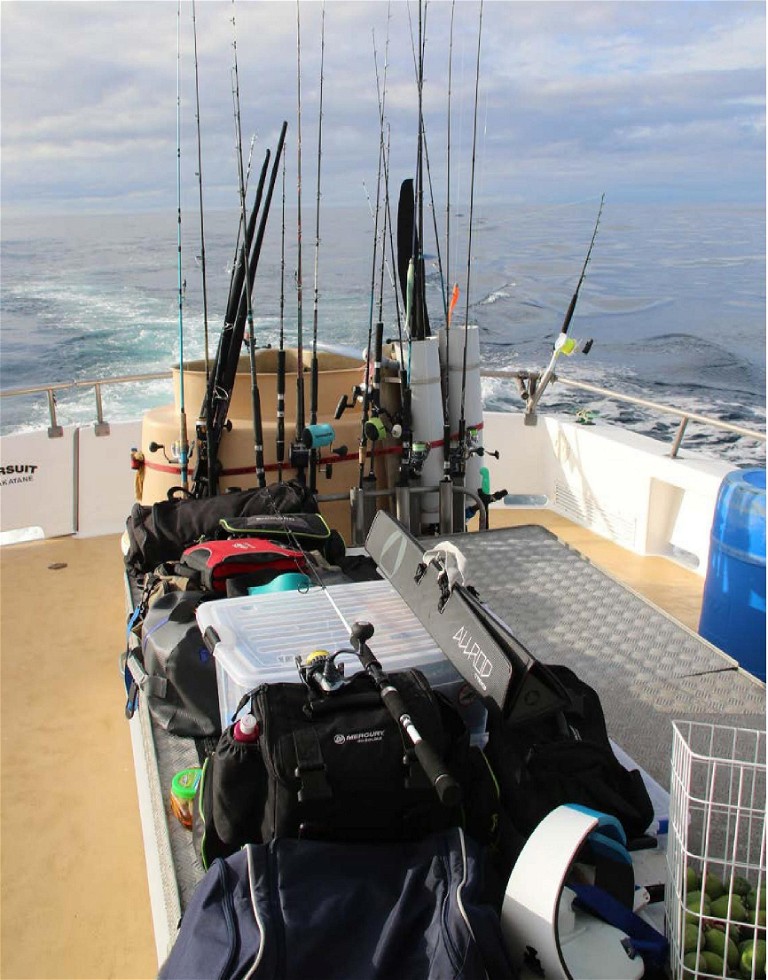
The writer likes to discuss the trip with the operator first to have all the bases covered without taking along half a tackle store.
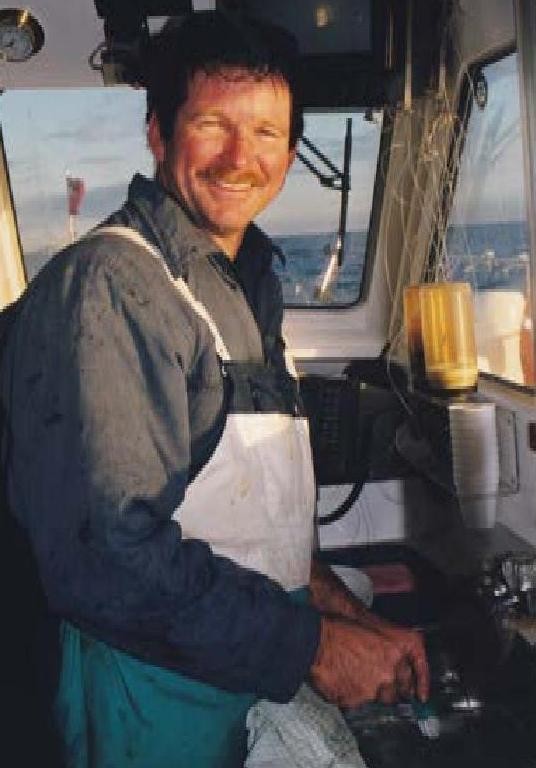
Rex Smith in the galley preparing coffees – it’s not just about the fishing.
Comms the key
Rex Smith has been running charter boats out of the Hauraki Gulf’s Gulf Harbour for 33 years, mostly aboard Kiwi Angler, a boat he and his father built.
“While our stock standard trips target snapper, there are plenty of ways of achieving a good result given the experience of the anglers and conditions on the day. Talk to us and we have a number of game plans for a range of circumstances, all designed to put fish in the bin but importantly, get everyone home safely at the end of the day,” Rex says.
“I don’t know a charter skipper who doesn’t want his clients to catch fish and have a good time, but the safety element will always be paramount in my mind, but not all the anglers see it that way.”
Rex suggests you will get a lot more out of the trip if you talk with the skipper and involve them early.
“I am not just the old man driving the bus, don’t be afraid to come and talk to me. You might even learn something that improves your chances of success. While the lack of comms never helps, I don’t need someone in my ear telling me when I am having a bad day!”
Anglers that have little respect for the boat or gear irk skippers. Repeated banging sinkers against the side of the hull, leaving tackle boxes unsecured so they tip over and spread gear everywhere at the first hint of the boat rolling with the waves, and the number one sin – cutting bait on anything other than a designed board, will all get the skipper’s dander up. For Rex, fishing braid alongside mono line is also a recipe for disaster.
“It is fine if you can manage the line but 70% of our anglers can’t. Mono is far more forgiving, especially when lines become tangled.”
Do your homework
Veteran charter fisher, and NZ Fishing News current contributor and former staffer, Mark Kitteridge advises people to do their homework.
“By asking the right questions you can determine the skipper’s experience to deliver what you want to achieve. It may be light tackle, topwater lure angling, saltfly, jigging or targeting a specific species.
“Having a vessel ‘fit for purpose’ is another key factor in determining if a particular charter operation can deliver what you want.”
Mark says there are issues he has encountered on trips that have made for a less enjoyable experience. The skipper and crew drinking, not keeping an eye on the clients, not caring for the fish adequately and fishing uninvited head his list.
“It always comes back to good communication so everyone has reasonable expectations as to how their charter might pan out.”
Have a game plan
Auckland’s professional skipper Geoff Lamond has crewed and run charter boats both here and overseas and has a good handle on getting the most out of any trip.
“Having everyone on the same wavelength right at the starting point will set any trip off on the right footing,” Geoff says.
Geoff’s last major gig was on Arenui, a 45ft O’Brien which specialised in multi-day stay-away charters to the likes of the Three Kings.
Going to the ‘Kings’ is a bucket list trip for many anglers who often wanted to run the full gambit of angling options.
“We had the gear on board to make many of the standard options possible – tease and switch for billfish, deep dropping for swordfish, jigging and livebaiting for kingfish and bottom bouncing for ‘puka. Having explained that and then seeing the clients arrive armed to the teeth with a heap of superfluous gear was not the right foot to start the charter on.”
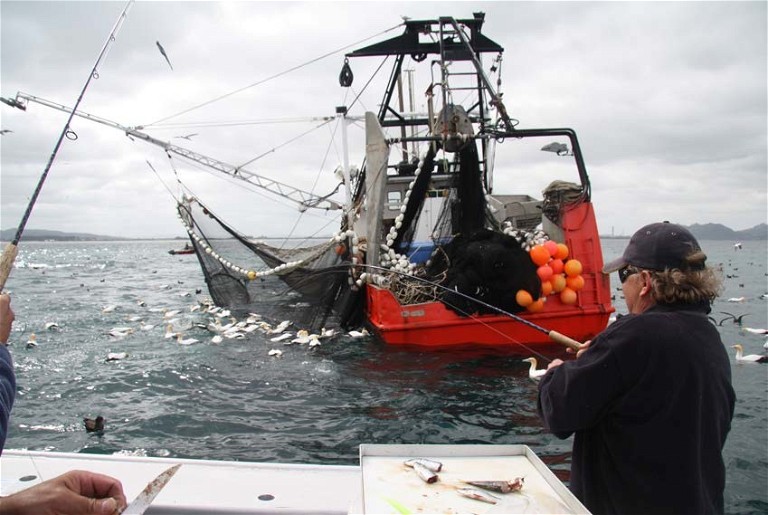
Veteran angler Mark Kitteridge says the success of any trip always comes back to good communication so everyone has reasonable expectations as to how their charter might pan out.
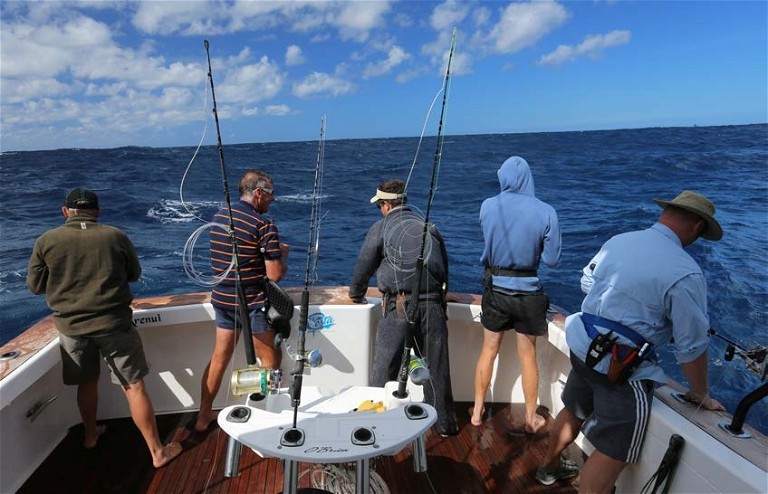
While the Marlin Master Classes aboard Arenui were essentially a gamefishing trip, the skipper Geoff Lamond and clients always found an appropriate time for a bit of bottom bashing.
The same applied to dive gear. Having to find last-minute stowage for dive bags and multiple tanks was often difficult, especially when the boat was fully loaded for a long liveaboard trip.
“Consuming excessive amounts of alcohol does not always make for a good trip. The crew will work hard to provide the best experience possible for the clients who need to be sharp to take advantage of this.
“We used to do quite a bit of ‘tease and switch’ for billfish. Coordinating the bait pitch to pull the fish away from the teaser takes a bit of skill, especially in rough conditions. The angler needs to be up for it.
“People pay good money for these top-end charters, so why lessen the experience due to the effects of a hangover?”
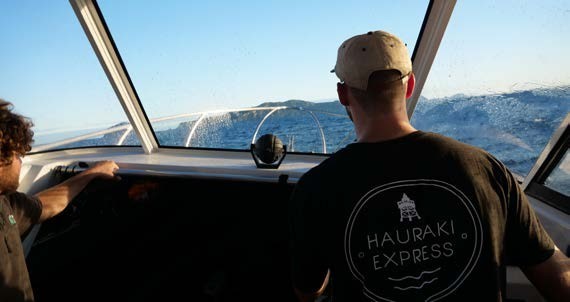
“If the clients brought positive energy and I got along well with them, funnily enough I would always go the extra mile.”
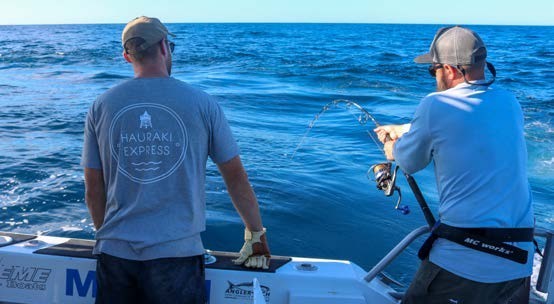
Listeners are learners
NZ Fishing News Editor-in-Chief Nick Jones has seen both sides of the coin, having been a Hauraki Gulf charter skipper/guide as well as a charter client and agrees with the sentiments expressed above.
“Comms start well before the trip is ever booked when anglers need to do their research as to which operations suit their requirements.”
Targeting Hauraki Gulf snapper and kingfish, Nick exclusively fished lures and livebaits so quite often anglers were unfamiliar with the techniques utilised.
“You know you might possibly be in for an interesting day when clients came on board and said, ‘C’mon mate, no bait?’
“Success with slowjigs and livebaits is super simple and can be achieved straight away by absolute greenhorns, but clients need to listen. There’s no point striking on a kingfish bite when the livie’s tethered to a circle hook!
“The skipper is the one who’s out there doing it all the time – so try to take their advice with an open mind.”
Aside from communication and understanding, Nick reckons attitude is crucial.
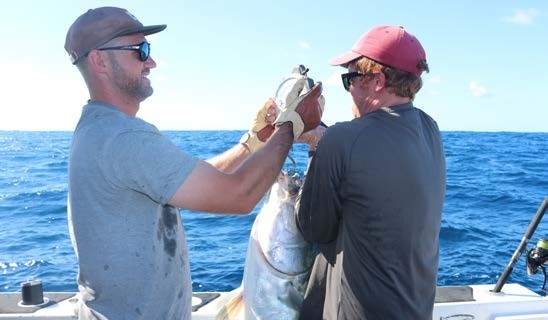
“If the clients brought positive energy and I got along well with them, funnily enough I would always go the extra mile.
“At the end of the day, I was a pretty relaxed captain. I wanted my customers to enjoy their drinks, crank up the music, and have a laugh – as long as they weren’t being dickheads!”